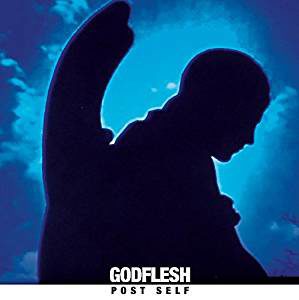Since the band’s inception in 1988, the Godflesh barometer has swung from the brutal minimalism of albums such as ‘Hymns’ and the recent ‘A world lit only by fire’ to more atmospheric fare such as ‘songs of love and hate in dub’, the latter being a remix album that operates as an essential companion-piece to the original work, expanding upon the dense rhythms and creating an entirely new experience for the listener. Justin K. Broadrick, the band’s driving force, is possessed of an endlessly questing spirit that thirsts for innovation, which goes some way to explaining the numerous other projects he has formed over the course of his career, and here we see him utilising all his skills on an album that surpasses previous achievements. On ‘Post Self’, that apocalyptic dub sound returns for an album that takes influence from the late 70’s / early 80’s post-punk movement, incorporating elements of Killing Joke and Throbbing Gristle to deliver a remarkable piece of cinematic music that neatly evokes the shifting post-industrial landscape of the band’s home town of Birmingham.
Far less savage than the remorseless and harrowing ‘a world lit only by fire’, the initial feel of ‘post self’ is of hypnotic horror, the bass-heavy production rendering the industrial beats with clarity whilst the guitars grind and fizz at the song’s core. Throughout, there is a somnolent pulse to the music that serves to engage rather than alienate. It is a powerful start to the album, drawing the listener in and capturing the nihilistic spirit of early Killing Joke. Similarly, whilst ‘Parasite’ may be informed by white hot rage, it is built upon a beat that propels things forward no matter how coruscating the guitars. Even better is the elastic bass and pulsing beat of ‘No body’, a throbbing monstrosity that would easily pack the floor of a rock club despite its heavily distorted beats and atonal riffing. As things progress, the album continues to throw sonic curve-balls with the tribal ‘mirror of finite light’ which, with its clean vocals and loping rhythm, sounds like a long-lost Killing Joke track filtered through the harsh soundscapes of Skinny Puppy. The album arguably reaches its peak with the ambient noise of ‘Be God’, a slow-motion walk into the mouth of madness filled with wordless vocals that scream and rage from the darkness. Production-wise it is clear that Godflesh have outdone themselves, conjuring up as effective a sonic rendering of hell as you’d ever wish to hear.
Remaining in an ambient mode reminiscent of Jesu, ‘The cyclic end’ is built around heartbeat percussion whilst the eerie, cyclical guitar provides a sheet-metal backdrop for the clean vocals that adorn the track. Announcing its presence with a stabbing, atonal riff, ‘Pre self’ is pure industrial horror harking back to the devastating remix work Coil undertook for Nine Inch Nails, scattering vocals across a mechanistic backdrop that seeks to undermine the sanity with its relentless grind. Next up, the churning bass and stabbing electronica of ‘mortality sorrow’ tears holes in your speakers as a robotically-processed voice exhorts you from the darkness, only for a synth-line that is pure Gary Numan to snap you back to a semblance of reality. Sinister and awash with atmosphere, ‘in your shadow’ buries the vocals so deep in the mix that it may as well be an instrumental, its filmic feel only serving to heighten the overall atmosphere of the album. The record concludes with ‘the infinite end’, another track that dispenses almost entirely with lyrics in favour of wordless vocalisations that fit more comfortably with the apocalyptic vibe of the music. It proves a satisfying conclusion to a work of impressive depth and scope.
An album driven by atmosphere and feel, ‘Post Self’ frequently eschews Justin’s gruff bark, allowing the songs to ebb and flow in a manner that is all the more evocative for its absence. The music here is cinematic in a manner more commonly associated with Jesu, although the overarching sense of palpable rage remains present and intact. As with the artists that influenced it, ‘Post Self’ is an album best heard as a coherent piece, winding its way from the more traditionally Godflesh-esque opening tracks to the densely hypnotic and involving final pieces. It is a mood piece and one that perfect encapsulates the impotent rage of modernity. 9




